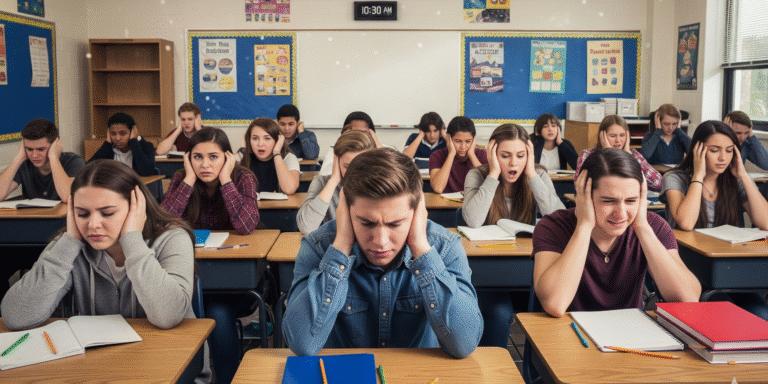The Handheld Wrecking Balls of the Classroom
As I near the end of my 27th year in teaching, I have observed a recurring trend in the past several years of my career: Every April for the past 7 or 8 years, I have experienced an inner tug urging me to explore career opportunities beyond the realm of teaching. I’ve discovered that many teachers across the state share these sentiments. Initially, I could easily brush off these thoughts after a week or two of summer break, but ever since the pandemic, it has become increasingly challenging to ignore them.
Educators often notice a cyclical pattern throughout the academic year. While the first few weeks can be demanding, we gradually adapt and align ourselves with the school year’s rhythm.
Covid’s Lingering Effects

The masked, pandemic-impacted 2020-2021 academic year was undoubtedly the most challenging of my career. Teaching with a mask proved both physically and emotionally draining, as students’ masks seemed to create an impenetrable barrier to engagement. As a result, student involvement in the classroom dwindled significantly, creating a palpable, chilly atmosphere.
Little did I anticipate that the following years would be even more demanding.
Early in the current school year, numerous colleagues expressed that they already felt the fatigue typically associated with April. This sparked concerns about what the actual months of April and May would bring. Now, we are experiencing it firsthand.
Although masks are no longer mandatory, the impact on student engagement remains strikingly similar to the previous years, with a continuous decline each semester.
A Great Tool to Destroy Education

Has pandemic-induced isolation possibly diminished teenagers’ ability to engage in personal interactions? Modern smartphones offer many comforts previously obtained through personal relationships without requiring physical effort or verbal communication. Ask any teacher, and they will confirm that cell phone addiction has only intensified over time. Numerous studies have found that the instant gratification provided by smartphones affects the brain’s pleasure centers in the same way as drugs or slot machines.
Despite the highly addictive nature of these devices, we still allow their use on campus with few restrictions. I often tell my students I couldn’t design a better tool to deprive them of an education than the modern smartphone. I have tried to resist this trend, but without the full support of the school district, teachers’ efforts are akin to stopping a tsunami with their bare hands.
Expecting each teacher to enforce their own cell phone policies is comparable to asking every police officer to establish their own speed limits. The most lenient policies ultimately become the standard for everyone.
The constant struggle with this issue is exhausting, as are all perpetual battles. This ongoing conflict leads many educators to contemplate abandoning efforts to enforce cell phone rules. At that point, teachers face two choices: relinquishing their hope for engaged classrooms or seeking a different profession.
It’s rare to find a teacher who doesn’t enjoy sharing their knowledge with students, but many feel that their current efforts are not truly teaching. I’ve encountered many dispirited teachers who voice their dismay, declaring, “The constant struggle with cell phones in the classroom has made teaching unbearably frustrating, to the point where I can’t bear the thought of continuing!

If the district implements a policy to remove cell phones and other similar electronic devices from the classroom, it will address the troublesome issues of disinterest and lack of concentration that affect many classrooms. Although getting rid of cell phones in classrooms might not be a panacea, teachers believe that doing so can play a significant role in rebuilding an environment conducive to learning.
Turning the Corner By Taking a Stand Against Phones

Most teachers I know genuinely enjoy teaching and interacting with students when the classroom is free from distractions and obstacles that hinder learning. However, despite many regrets, some educators will reluctantly walk away without that safeguard. It is of utmost importance that we prioritize improving teachers’ working conditions and concentrate on fostering an ideal learning atmosphere within the classroom.
While technology has provided countless benefits in the modern world, it has also led to the widespread use of highly addictive devices like smartphones, which obstruct student learning. Moreover, the constant, unchecked use of such technology does not prepare students for the rigors of college or the rightful expectations of employers.







